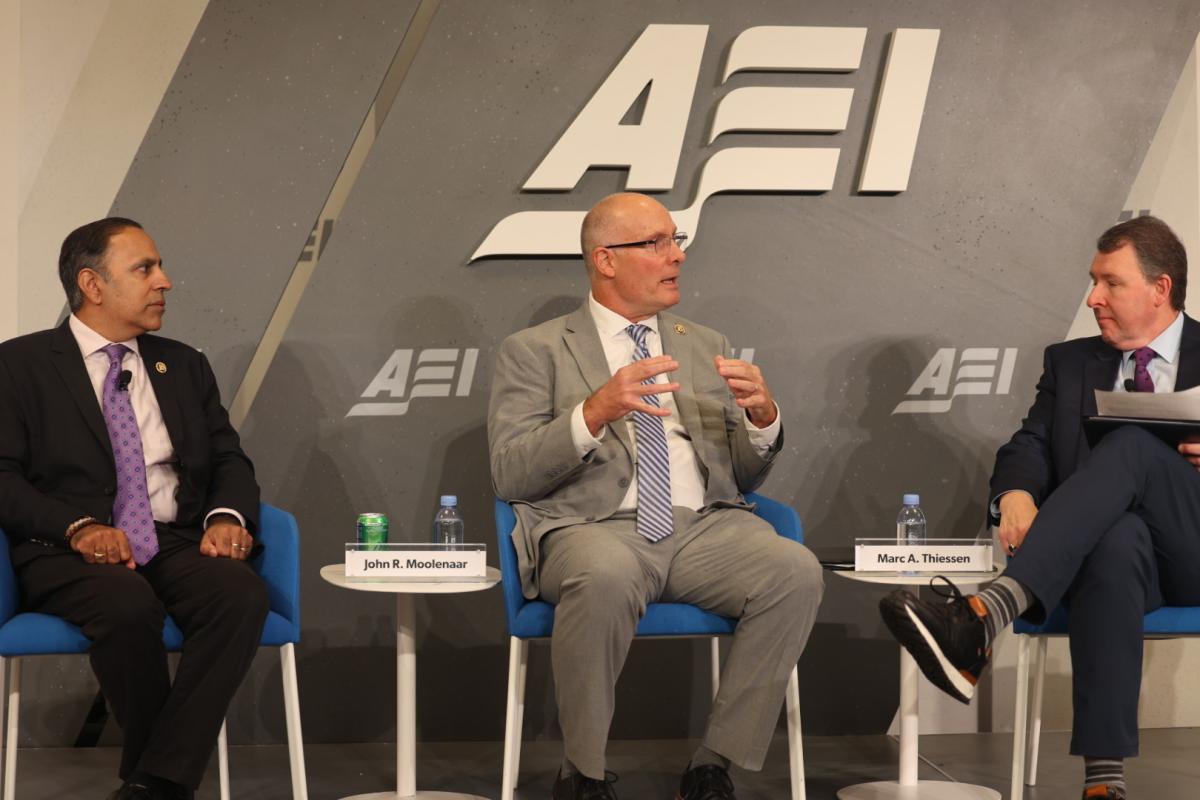Moolenaar, Krishnamoorthi Speak at American Enterprise Institute on Risk Posed by Certain Chinese Companies to U.S. National Security

Chairman John Moolenaar (R-MI) and Ranking Member Raja Krishnamoorthi (D-IL) of the House Select Committee on the Chinese Communist Party participated in a bipartisan discussion at the American Enterprise Institute (AEI) about the risk certain Chinese companies pose to U.S. national security.

The Chairman and Ranking Member each delivered opening remarks followed by a panel discussion moderated by AEI Senior Fellow Marc Thiessen and focused on several Chinese companies operating in the United States that could disrupt supply chains and steal American intellectual property.
Watch Chairman Moolenaar's opening remarks below and read the transcript HERE.

Chairman Moolenaar delivers opening remarks outlining the "loaded gun" threat:
"Looking for a “smoking gun” though is the wrong way to think about China-related risk. After all, a smoking gun means a shot has already been fired. Demanding to see smoking guns before taking action puts policymakers into a reactive posture. When our country’s leaders have failed to connect the dots and take action, there have been catastrophic consequences including Pearl Harbor and 9/11," said Chairman Moolenaar. "This is strategically unwise and financially ruinous. Consequently, I would like to spend some time outlining why we need to be looking not for “smoking guns” but instead “loaded guns”– Chinese companies that because of the technology they provide or the supply chains they impact, pose an unacceptable risk to our country’s security. Even Chinese companies that claim to be private, may be called upon by the Party to advance its interests at the expense of ours at any time, for any reason through the CCP’s national security law.
The Chairman specifically mentioned Chinese companies BGI Group, Semiconductor Manufacturing International Corporation (SMIC), and ZPMC.
The Chairman continued, "Going forward, we need to be asking whether a given company, through its technology or supply chain reach, could provide the CCP with the ability to threaten our national or economic security interests. If the answer is yes, we need to act with the presumption that the company in question will one day be used by the CCP to threaten our national security, and then we need to take appropriate steps to proactively stop the threat. The Chinese government, through its actions, has foreclosed the opportunity for Chinese companies to receive the benefit of a doubt. So how do we get ahead of the problem? I would suggest at least three key steps:
"First, for the sake of our national security, we need to implement appropriate barriers to our market, particularly in strategic sectors, to prevent malign PRC companies from undermining U.S. technology and undercutting American businesses. We must also leverage and build upon crucial existing authorities to ensure PRC tech products, from LiDAR to genetic sequencers, do not gain access to our sensitive data or critical infrastructure. This includes expanding CFIUS jurisdiction to include foreign companies entering critical U.S. industries. Following the same logic it currently uses to assess national security risk when it comes to transactions, CFIUS should be assessing whether allowing a Chinese entity to enter a sensitive sector of the U.S. economy could pose a risk to our national security.
Second, we need to cut off access to U.S. technology and capital that fuels PRC national champions and critical sectors. By enacting outbound investment restrictions and stronger export controls, we can stop fueling our own demise. We cannot outrun the CCP if we are providing a wind at its back.
Finally, while we will lead, we must also coordinate with our allies and encourage them to mirror these steps and secure their own supply chains, technology, and domestic markets. We will need relentless diplomacy and constant reinforcement to bring our allies aboard."
A recording of the event in full can be found HERE, with pictures HERE.